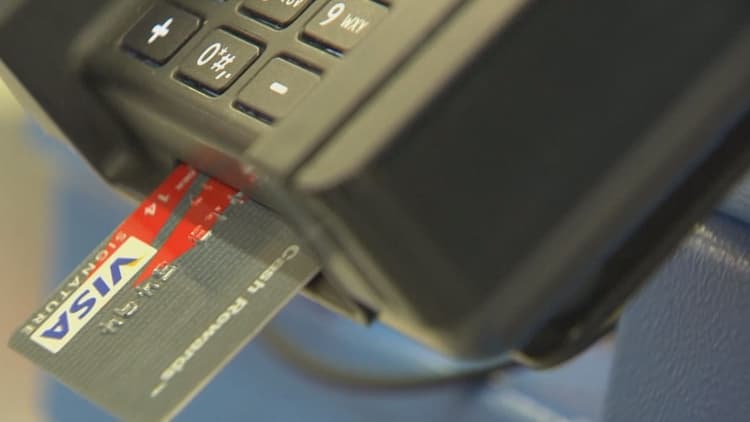If your summer vacation plans include flying to your destination, don't be surprised if you come across an offer for an airline credit card.
With enticing benefits and sign-up bonuses, these cards can make your future flights less expensive as you earn air miles for purchases made on the card. Yet if you don't use them right, they'll only end up costing you.
"If you travel a lot, these cards can give you a lot of value ... but there are some things about them that people should be aware of," said Bailey Peterson, a credit card analyst at ValuePenguin and author of a recent study that looked at how these cards stack up against one another.
Here's the skinny.
The sign-up bonus
One of the common enticements of these credit cards is a sign-up bonus. This generally comes in the form of extra miles earned for charging a certain amount on your card within the first few months. The average value of the bonus is $400, the ValuePenguin study found.
To get the perk, however, the average amount you have to spend is $1,388, according to the ValuePenguin study. Some of the cards require you to spend far more — $3,000 or $5,000 — in that three-month window to earn the bonus.
"After that point, we recommend looking at whether these cards are worth it," Peterson said. "They'll be much more expensive [due to an annual fee] than the average cash-back card."
The yearly hit
Indeed, these airline cards typically come with a fee you'll pay every year.
While many of the cards will waive the fee in the first year, after that you'll be on the hook for an average of $127 each year. You'll pay that whether you use the card or not.

About 88 percent of airline cards come with the yearly fee, compared with 12 percent for cash-back cards, according to ValuePenguin data.
Interest on balances
As with any credit card, you'll accrue interest on your purchases if you don't pay your balance in full each month.
The interest rate for airline credit cards ranges from about 15 percent to 22 percent, ValuePenguin data show. The average interest rate across all credit cards is about 16.7 percent, according to separate data from Creditcards.com.
"If you get a card and spend too much trying to earn miles, it's not going to be worth it," Peterson said. "The interest you pay will wipe out any benefits you gain from your spending."
More from Personal Finance:
What could go wrong on your quest for credit card points
These mistakes can ruin your summer vacation. Here's how to avoid them
How to avoid getting duped by a bogus initial coin offering
Dropping value
The ValuePenguin study found that the value of airline credit cards drops off significantly after the first 12 months. Basically, the combination of sign-up bonuses and waived first-year fees means the biggest bang for your buck comes in the first year.
"The value drop-off is pretty significant," Peterson said. "It's usually 50 percent. We recommend looking at the second year to determine the card's value."
Ongoing benefits
However, there are typically benefits that come with owning a card beyond earning miles.
For instance, many cards offer special companion fares that let you get an annual free or a discounted flight with the purchase of a ticket. Or, you might get a certain number of free checked bags for each flight.
Keep in mind, though, that some airlines will restrict that benefit, such as only allowing it for certain seats and destinations.
Nevertheless, these benefits can be valuable to frequent travelers. The important thing is to weigh the value of those extras — and any miles you earn for purchases — against the yearly fee you pay.


